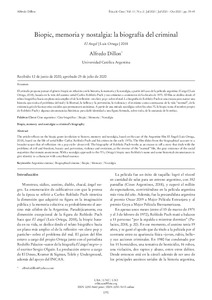Por favor, use este identificador para citar o enlazar este ítem:
https://repositorio.uca.edu.ar/handle/123456789/12465| Título: | Biopic, memoria y nostalgia : la biografía del criminal : El Ángel, Luis Ortega, 2018 Biopic, memory and nostalgia : a criminal’s biography : El Ángel, Luis Ortega, 2018 |
Autor: | Dillon, Alfredo | Palabras clave: | BIOGRAFIAS; FILM; CINE ARGENTINO; BIOPIC; BIOGRAFIAS; MEMORIA; Ortega, Luis, 1980-; El Ángel; Robledo Puch, Carlos Eduardo, 1952- | Fecha de publicación: | 2021 | Editorial: | Universidad de Oslo Universidad de Buenos Aires. Facultad de Psicología Universidad Nacional de Córdoba. Facultad de Psicología |
Cita: | Dillon, A. Biopic, memoria y nostalgia : la biografía del criminal : El Ángel, Luis Ortega, 2018 [en línea]. Ética y Cine Journal. 2021, 11 (2). Disponible en: https://repositorio.uca.edu.ar/handle/123456789/12465 | Proyecto: | El género biográfico en el cine argentino contemporáneo | Resumen: | Resumen: El artículo propone pensar el género biopic en relación con la historia, la memoria y la nostalgia, a partir del caso de la película argentina El ángel (Luis
Ortega, 2018), basada en la vida del asesino serial Carlos Robledo Puch y sus crímenes a comienzos de la década de 1970. El film se desliza desde el
relato biográfico hacia un plano más amplio: el de la reflexión –en clave pop– sobre el mal. La biografía de Robledo Puch es una excusa para narrar una
historia que rodea el problema del mal y la libertad, la belleza y la perversión, la violencia y el erotismo como contracaras de la vida “normal”, de la
existencia gris de las mayorías sociales que permanecen anónimas. A partir de una mirada nostálgica sobre los años 70, la biopic toma el nombre propio
de Robledo Puch y algunas circunstancias históricas para darle identidad a una figura formada, sobre todo, de la sustancia de lo mítico. Abstract: The article reflects on the biopic genre in relation to history, memory and nostalgia, based on the case of the Argentine film El Ángel (Luis Ortega, 2018), based on the life of serial killer Carlos Robledo Puch and his crimes in the early 1970s. The film slides from the biographical account to a broader scope: that of reflection –in a pop style– about evil. The biography of Robledo Puch works as an excuse to tell a story that deals with the problems of evil and freedom, beauty and perversion, violence and eroticism, as the reverse of the “normal” life, the gray existence of the social majorities that remain anonymous. With a nostalgic approach to the 70’s, Ortega’s biopic uses Robledo’s name and some historical circumstances to give identity to a character with a mythical essence. |
Cobertura Espacial: | Argentina | URI: | https://repositorio.uca.edu.ar/handle/123456789/12465 | ISSN: | 2250-5660 (impreso) 2250-5415 (on line) |
Disciplina: | CIENCIAS SOCIALES | Derechos: | Acceso abierto | Fuente: | Ética y Cine Journal. 2021, 11 (2) |
| Aparece en las colecciones: | Artículos |
Ficheros en este ítem:
| Fichero | Descripción | Tamaño | Formato | |
|---|---|---|---|---|
| biopic-memoria-nostalgia.pdf | 236,33 kB | Adobe PDF |  Visualizar/Abrir |
Visualizaciones de página(s)
314
comprobado en 27-abr-2024
Descarga(s)
93
comprobado en 27-abr-2024
Google ScholarTM
Ver en Google Scholar
Este ítem está sujeto a una Licencia Creative Commons

